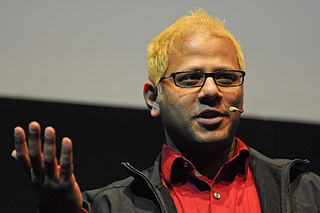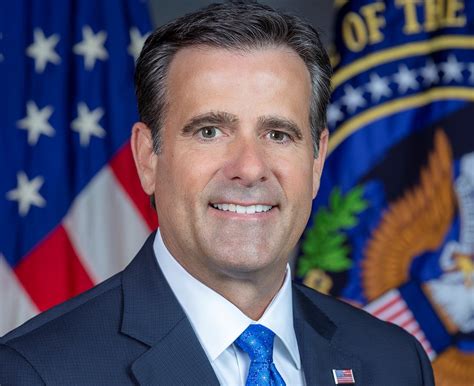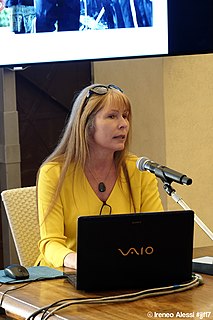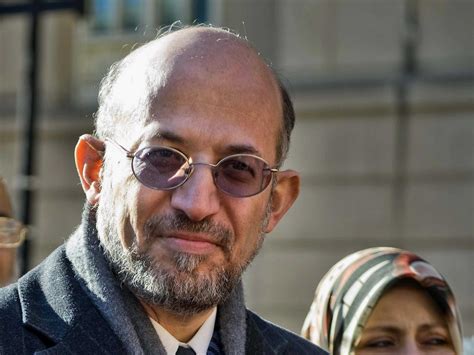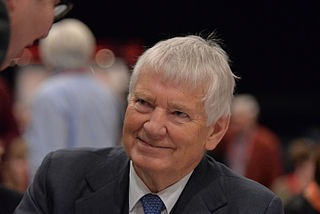Top 1200 Surveillance State Quotes & Sayings
Explore popular Surveillance State quotes.
Last updated on April 14, 2025.
A cashless society promises a world of limitation, control, and surveillance - all of which the poorest Americans already have in abundance, of course. For the most vulnerable, the cashless society offers nothing substantively new; it only extends the reach of the existing paternal bureaucratic state.
Many of our ally states don't have these constitutional protections - in the UK, in New Zealand, in Australia. They've lost the right to be free from unreasonable search and seizure without probable cause. All of those countries, in the wake of these surveillance revelations, rushed through laws that were basically ghostwritten by the National Security Agency to enable mass surveillance without court oversight, without all of the standard checks and balances that one would expect.
The State, of course, is absolutely indispensable to the preservation of law and order, and the promotion of peace and social cooperation. What is unnecessary and evil, what abridges the liberty and threatens the true welfare of the individual, is the State that has usurped excessive powers and grown beyond its legitimate function - the super-State, the socialist State, the redistributive State, in brief, the ironically misnamed 'Welfare State.'
The combination of the growth of these digital technologies, the ability of the government to conjure up these secret interpretations, plus a very unusual and novel court make for this ever-expanding surveillance state. We so treasure our freedoms; we will regret it if our generation doesn't use this unique time to reform the surveillance laws and make it clear that security and liberty are not mutually exclusive. We can do both.
The Internet may well disempower the nation state, but at the same time, it also strengthens certain specific state functions - like surveillance. As a political entity, it doesn't empower the nation sate. It creates the availability of much more data than the digestive system of the nation state could possibly assimilate.
The Baathist state did two things extremely well. One was create information-gathering intelligence networks and a filing system. There's actually a lot of information on a lot of people and that is a major achievement of a police state. The second one is the promotion of literature and poetry, and the arts generally. So this is a state that's producing mass police archives - surveillance - and poetry. And in fact a lot of the archives are about what poets are writing or what they should be writing.
When we have some horrible terrorist attacks happen in some country we see in the recording that follows, that the intelligence community already knew about these people in advance. We know that these countries were involved in intelligence sharing premiums, that they benefited from mass surveillance, and yet they didn't stop the attacks. Yet at the same time we immediately see intelligence officials running to the newspapers and claiming that we need more surveillance, that we need more intrusion, that we need more expense of powers because it could have stopped an attack.
No matter the specific techniques involved, historically mass surveillance has had several constant attributes. Initially, it is always the country’s dissidents and marginalized who bear the brunt of the surveillance, leading those who support the government or are merely apathetic to mistakenly believe they are immune. And history shows that the mere existence of a mass surveillance apparatus, regardless of how it is used, is in itself sufficient to stifle dissent. A citizenry that is aware of always being watched quickly becomes a compliant and fearful one.
What we're really debating is not security versus liberty, it's security versus surveillance. When we talk about electronic interception, the way that surveillance works is it preys on the weakness of protections that are being applied to all of our communications. The manner in which they're protected.
Turn off your televisions. Ignore the Newt-Mitt-Rick- Barack reality show. It is as relevant to your life as the gossip on “Jersey Shore.” The real debate, the debate raised by the Occupy movement about inequality, corporate malfeasance, the destruction of the ecosystem, and the security and surveillance state, is the only debate that matters.
Many of the benefits from keeping terrorism fear levels high are obvious. Private corporations suck up massive amounts of Homeland Security cash as long as that fear persists, while government officials in the National Security and Surveillance State can claim unlimited powers and operate with unlimited secrecy and no accountability.
I am disturbed by how states abuse laws on Internet access. I am concerned that surveillance programmes are becoming too aggressive. I understand that national security and criminal activity may justify some exceptional and narrowly-tailored use of surveillance. But that is all the more reason to safeguard human rights and fundamental freedoms.
... we grapple with this 'law of sin' (Rom. 8:2) and expel it from our body, establishing in its place the surveillance of the intellect. Through this surveillance we prescribe what is fitting for every faculty of the soul and every member of the body. For the senses we prescribe what they should take into account and to what extent they should do so, and this exercise of the spiritual law is called self-control.
Merging the ability to conduct surveillance that reveals every aspect of a person's life with the ability to conjure up the legal authority to execute that surveillance, and finally, removing any accountable judicial oversight, creates the opportunity for unprecedented influence over our system of government.
Someone recently talked about mass surveillance and the NSA revelations as being the atomic moment for computer scientists. The atomic bomb was the moral moment for physicists. Mass surveillance is the same moment for computer scientists, when they realize that the things they produce can be used to harm a tremendous number of people.
The merging of the military-industrial complex, surveillance state and unbridled corporate power points to the need for strategies that address what is specific about the current warfare and surveillance state and the neoliberal project and how different interests, modes of power, social relations, public pedagogies and economic configurations come together to shape its politics.






